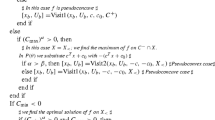Abstract
An algorithm based on partial linearization is proposed to deal with generalized fractional programs. This algorithm is shown to be equivalent to the so called generalized Dinkelbach's algorithm applying to this problem. Hence we have another setting for this last algorithm.
Zusammenfassung
Es wird ein Algorithumus zur Lösung von verallgemeinerten Quotientenprogrammen vorgeschlagen, der auf partieller Linearisierung des Problems beruht. Der Algorithmus erweist sich als äquivalent zum sogenannten verallgemeinerten Dinkelbach Algorithmus.
Similar content being viewed by others
References
Borde J, Crouzeix JP (1987) Convergence of a Dinkelbach-type algorithm in generalized fractional programming. Zeitschrift für Operations Research 31:A31-A54
Charnes A, Cooper WW (1962) Programming with linear fractional functionals. Naval Research Logistics Quarterly 9:181–186
Crouzeix JP, Ferland JA, Schaible S (1983) Duality in generalized linear fractional programming. Mathematical Programming 27:342–354
Crouzeix JP, Ferland JA, Schaible S (1985) An algorithm for generalized fractional programs. Journal of Optimization Theory and Applications 47:35–49
Crouzeix JP, Ferland JA, Schaible S (1986) A note on an algorithm for generalized fractional programs. Journal of Optimization Theory and Applications 50:183–187
Dinkelbach W (1967) On non-linear fractional programming. Management Science 13:492–498
Flachs J (1985) Generalized Cheney-Loeb-Dinkelbach-Type algorithms. Mathematics of Operations Research 10:674–687
Ibaraki T (1982) Solving mathematical programs with fractional objective functions. In: Schaible S, Ziemba WT (eds) Generalized concavity in optimization and economics. Academic Press, pp 441–472
Ibaraki T, Schaible S (1983) Invited review: fractional programming. European Journal of Operational Research 12:325–338
Robinson SM (1971a) Computational solution of ratio games by iterative linear programming. Technical Summary Report No 1140. Mathematics Research Center, University of Wisconsin, Madison
Robinson SM (1971b) Numerical solution of the irreductible Von Newmann economic model. Technical Summary Report No 1142. Mathematics Research Center, University of Wisconsin, Madison
Robinson SM (1972) A linearization technique for solving the irreductible Von Newmann economic model. In: Los J (ed) Proceeding of the conference on Von Newmann models. Polish Scientific Publishers (PWN), Warsaw. Also appeared as Technical Summary Report N:1290, Mathematics Research Center, University of Wisconsin, Madison
Schaible S (1976) Fractional programming — II, on Dinkelbach's algorithm. Management Science 22:868–873
Schaible S (1981) Fractional programming: applications and algorithms. European Journal of Operational Research 7:111–120
Author information
Authors and Affiliations
Additional information
This research was supported by NSERC (grant A8312) and FCAR (grant 0899).
Rights and permissions
About this article
Cite this article
Benadada, Y., Ferland, J.A. Partial linearization for generalized fractional programming. Zeitschrift für Operations Research 32, 101–106 (1988). https://doi.org/10.1007/BF01919185
Received:
Issue Date:
DOI: https://doi.org/10.1007/BF01919185




